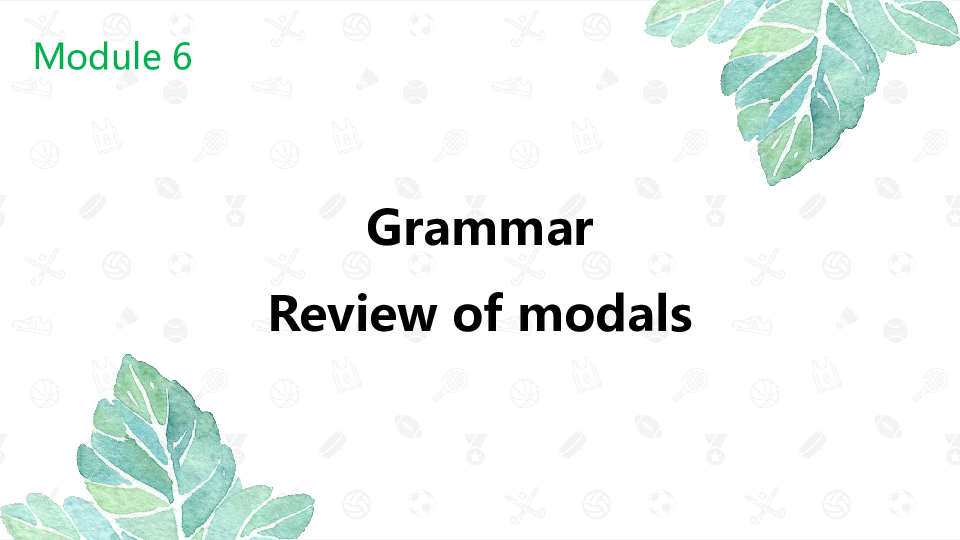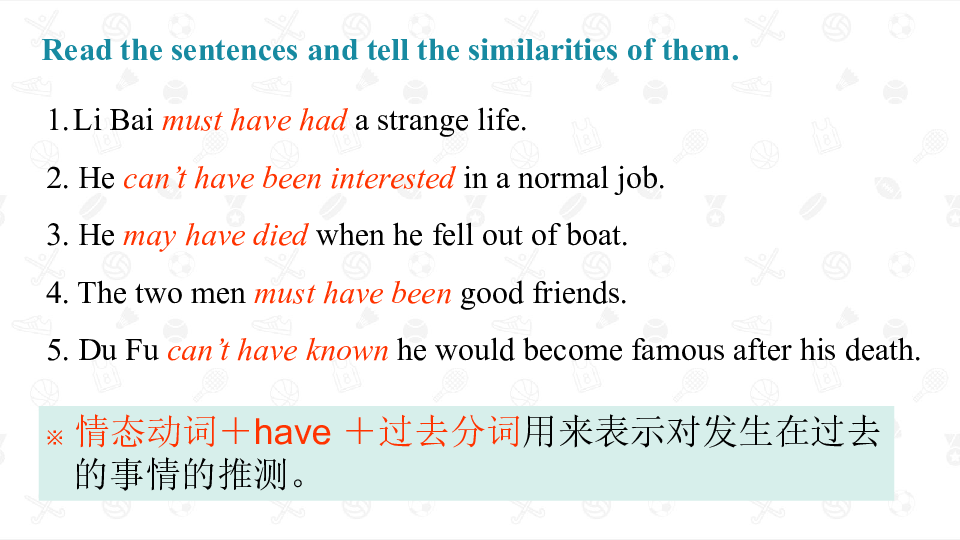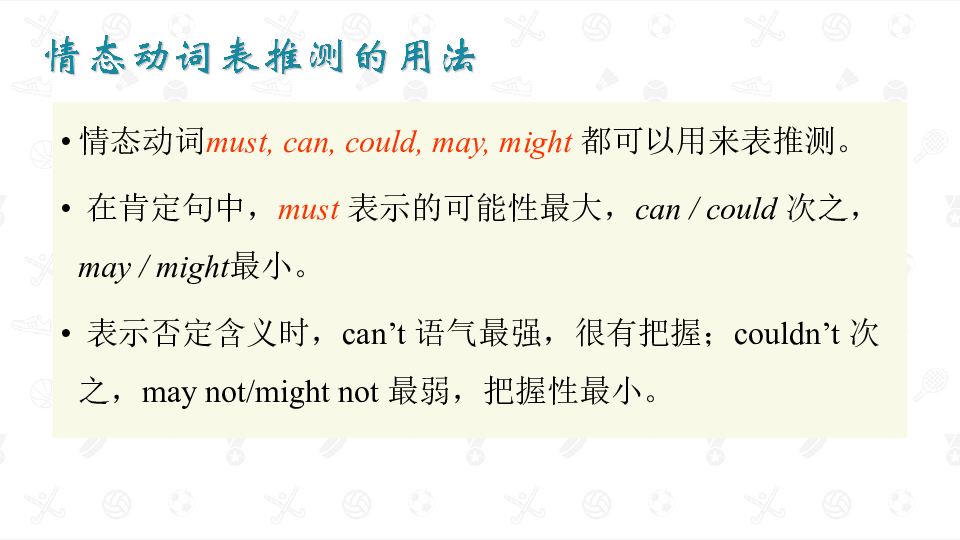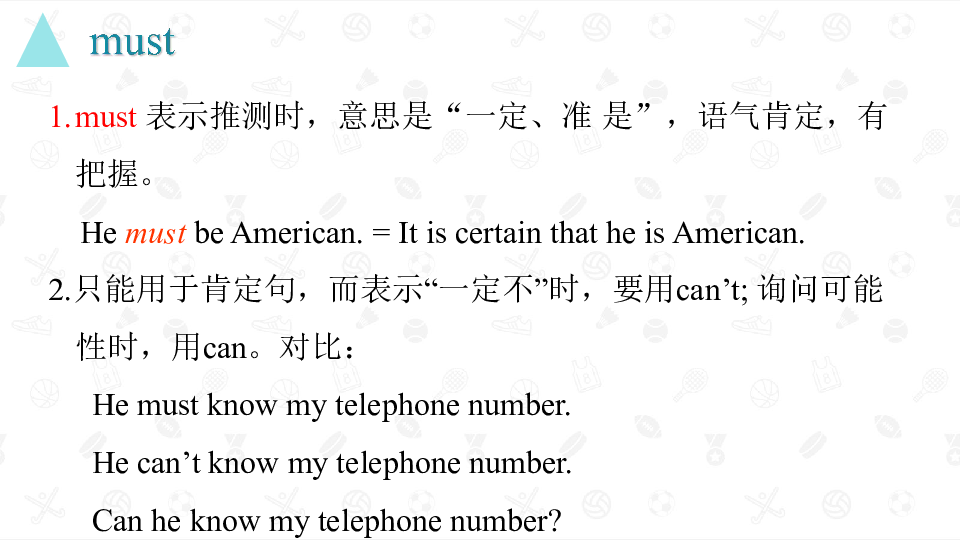外研版选修八 Module6 The Tang Poems Grammar 情态动词用法复习课件(共19张)
文档属性
| 名称 | 外研版选修八 Module6 The Tang Poems Grammar 情态动词用法复习课件(共19张) |  | |
| 格式 | zip | ||
| 文件大小 | 601.2KB | ||
| 资源类型 | 教案 | ||
| 版本资源 | 外研版 | ||
| 科目 | 英语 | ||
| 更新时间 | 2020-05-29 17:17:23 | ||
图片预览





文档简介
(共19张PPT)
Module
6
Grammar
Review
of
modals
The
topic
of
the
poem
can’t
be
travel.
2.
It
must
be
something
more
personal.
3.
It
may
be
friendship.
4.
It
might
be
the
journey
through
life.
※
情态动词+动词原形
用来表示对现在情况的推测。
Read
the
sentences
and
tell
the
similarities
of
them.
Li
Bai
must
have
had
a
strange
life.
2.
He
can’t
have
been
interested
in
a
normal
job.
3.
He
may
have
died
when
he
fell
out
of
boat.
4.
The
two
men
must
have
been
good
friends.
5.
Du
Fu
can’t
have
known
he
would
become
famous
after
his
death.
※
情态动词+have
+过去分词用来表示对发生在过去的事情的推测。
Read
the
sentences
and
tell
the
similarities
of
them.
情态动词表推测的用法
情态动词must,
can,
could,
may,
might
都可以用来表推测。
在肯定句中,must
表示的可能性最大,can
/
could
次之,may
/
might最小。
表示否定含义时,can’t
语气最强,很有把握;couldn’t
次之,may
not/might
not
最弱,把握性最小。
must
must
表示推测时,意思是“一定、准
是”,语气肯定,有把握。
He
must
be
American.
=
It
is
certain
that
he
is
American.
2.只能用于肯定句,而表示“一定不”时,要用can’t;
询问可能性时,用can。对比:
He
must
know
my
telephone
number.
He
can’t
know
my
telephone
number.
Can
he
know
my
telephone
number?
3.
must表推测的句型
must+动词原型
表示对现在情况的推测;
must
+be+v-ing形式
表示对正在发生情况的推测;
must+have+过去分词
表示对过去情况的推测。
must表示推测时很少用于将来的情况。
It’s
certain
/
I’m
sure
that
he
will
come
tomorrow.
can
/can’t
1.
can表示推测时,往往用于否定句或疑问句
can’t表示“一定不”,语气很肯定。
He
can’t
go
to
school
today.
=
It
is
impossible
that
he
goes
to
school.
Can
the
news
be
true?
2.
can
/can’t
表推测时的句型
can/can’t
+动词原型
表示对现在情况的推测
can
/can’t
+be+v-ing形式
表示对正在发生情况的推测
can/can’t
+have+过去分词
表示对过去情况的推测
1.
may/might
表示推测时,意思是“可能”“也许”,
语气上不是很肯定。
He
may
/
might
be
in
his
office
now.
=
It
is
possible
that
he
is
in
his
office.
注:might不表示过去时态,只是语气上比may更委婉,表示的可能性更小。
2.may,
might表推测时,可用于否定句,意为“可能不、也许不”,但不用于疑问句。
He
may
/
might
not
come
back
forever.
may/might
3、may/
might表推测时的句型:
may/
might+动词原型
表示对现在情况的推测
may/
might+be+v-ing
表示对正在发生的情况的推测
may/
might+have+过去分词
表示对过去情况的推测
could
1、could
表示推测,表示某事有可能发生或可能是事实。在肯定句中没有must那么有把握;在否定句中没有can’t那么有把握。
2、could
还可以用于表示客气、委婉、礼貌的请求语气。
Excuse
me,
could
you
tell
me
the
way
to
the
bus
station?
1.
should
可表示假设、意愿、可能性、义务、委托、建议、命令、目的等。
I
should
advise
you
to
say
less
and
do
more.(表意愿)
She
is
considering
how
she
should
answer.(表义务)
The
boys
shouldn’t
be
playing
football
at
this
time.?
(表可能性)
2、should(not)+have+过去分词
“本(不)应该
…”,含后悔、责备之意。
We
should
have
checked
the
time
before
we
left.
You
shouldn’t
have
lent
him
money
three
years
ago.
should
would是will的过去式,表示意志、习惯性、推测、设想、请求、愿望、疑惑等。
She
would
not
see
the
dentist
even
though
she
was
in
considerable
pain.
(意愿)
When
my
parents
were
away,
my
grandmother
would
look
after
me.
(习惯性)
The
person
you
mentioned
would
be
her
son.
(推测)
would
would/should/could
用于虚拟语气,
表与现在、将来或过去事实相反的假设。
If
I
were
you
,
I
should/could/would
quarrel
with
the
headmaster.
(与现在事实相反)
If
time
permitted
tomorrow,
I
should/would/
could
drive
you
to
the
station.
(与将来事实相反)
If
I
had
seen
him
last
night,
I
should/would/
could
have
gone
with
him.
(与过去事实相反)
would/should/could用于虚拟语气
1.should
have
done过去本来应该(而实际上并没有…)
should
not
have
done
本不应该
(而实际上却已经…)
We
should
have
studied
last
night,
but
we
went
to
the
concert
instead.
2.could
have
done“过去本来能够…”
,但实际上没做。
I
could
have
run
100
metres
in
12
seconds.
If
you
could
have
finished
the
task
in
time,
you
could
have
been
promoted.
情态动词
+
have
done表“本来…”
3.need
not
have
done
表示过去已做的事,事实上没有必要。
I
need
not
have
got
up
so
early.
I
need
not
have
waited
for
the
train
for
an
hour.
4.would
have
done
用在虚拟语气中,表示与过去事实相反的假设,常与if
的条件句连用。
I
would
have
helped
you
if
I
had
known
your
difficulties.
If
it
hadn’t
rained
yesterday,
we
would
have
gone
out
for
a
walk.
Practice
1.
Mr.
White
____
at
8:30
for
the
meeting,
but
he
didn’t
turn
up.
A.
should
have
arrived
B.
should
arrive
C.
should
have
had
arrived
D.
should
be
arriving
A
2.
If
he
had
been
here
yesterday,
he
______
this
pop
star.
A.
would
meet
B.
would
have
met
C.
met
D.
must
have
met
B
3.It
is
hard
for
me
to
imagine
what
I
would
be
doing
today
if
I
____
in
love
at
the
age
of
seven
with
the
Melinda
Cox
Library
in
my
hometown.
A.
wouldn’t
have
fallen
B.
had
not
fallen
C.
should
fall
D.
were
to
fall
B
Thanks
for
listening
Module
6
Grammar
Review
of
modals
The
topic
of
the
poem
can’t
be
travel.
2.
It
must
be
something
more
personal.
3.
It
may
be
friendship.
4.
It
might
be
the
journey
through
life.
※
情态动词+动词原形
用来表示对现在情况的推测。
Read
the
sentences
and
tell
the
similarities
of
them.
Li
Bai
must
have
had
a
strange
life.
2.
He
can’t
have
been
interested
in
a
normal
job.
3.
He
may
have
died
when
he
fell
out
of
boat.
4.
The
two
men
must
have
been
good
friends.
5.
Du
Fu
can’t
have
known
he
would
become
famous
after
his
death.
※
情态动词+have
+过去分词用来表示对发生在过去的事情的推测。
Read
the
sentences
and
tell
the
similarities
of
them.
情态动词表推测的用法
情态动词must,
can,
could,
may,
might
都可以用来表推测。
在肯定句中,must
表示的可能性最大,can
/
could
次之,may
/
might最小。
表示否定含义时,can’t
语气最强,很有把握;couldn’t
次之,may
not/might
not
最弱,把握性最小。
must
must
表示推测时,意思是“一定、准
是”,语气肯定,有把握。
He
must
be
American.
=
It
is
certain
that
he
is
American.
2.只能用于肯定句,而表示“一定不”时,要用can’t;
询问可能性时,用can。对比:
He
must
know
my
telephone
number.
He
can’t
know
my
telephone
number.
Can
he
know
my
telephone
number?
3.
must表推测的句型
must+动词原型
表示对现在情况的推测;
must
+be+v-ing形式
表示对正在发生情况的推测;
must+have+过去分词
表示对过去情况的推测。
must表示推测时很少用于将来的情况。
It’s
certain
/
I’m
sure
that
he
will
come
tomorrow.
can
/can’t
1.
can表示推测时,往往用于否定句或疑问句
can’t表示“一定不”,语气很肯定。
He
can’t
go
to
school
today.
=
It
is
impossible
that
he
goes
to
school.
Can
the
news
be
true?
2.
can
/can’t
表推测时的句型
can/can’t
+动词原型
表示对现在情况的推测
can
/can’t
+be+v-ing形式
表示对正在发生情况的推测
can/can’t
+have+过去分词
表示对过去情况的推测
1.
may/might
表示推测时,意思是“可能”“也许”,
语气上不是很肯定。
He
may
/
might
be
in
his
office
now.
=
It
is
possible
that
he
is
in
his
office.
注:might不表示过去时态,只是语气上比may更委婉,表示的可能性更小。
2.may,
might表推测时,可用于否定句,意为“可能不、也许不”,但不用于疑问句。
He
may
/
might
not
come
back
forever.
may/might
3、may/
might表推测时的句型:
may/
might+动词原型
表示对现在情况的推测
may/
might+be+v-ing
表示对正在发生的情况的推测
may/
might+have+过去分词
表示对过去情况的推测
could
1、could
表示推测,表示某事有可能发生或可能是事实。在肯定句中没有must那么有把握;在否定句中没有can’t那么有把握。
2、could
还可以用于表示客气、委婉、礼貌的请求语气。
Excuse
me,
could
you
tell
me
the
way
to
the
bus
station?
1.
should
可表示假设、意愿、可能性、义务、委托、建议、命令、目的等。
I
should
advise
you
to
say
less
and
do
more.(表意愿)
She
is
considering
how
she
should
answer.(表义务)
The
boys
shouldn’t
be
playing
football
at
this
time.?
(表可能性)
2、should(not)+have+过去分词
“本(不)应该
…”,含后悔、责备之意。
We
should
have
checked
the
time
before
we
left.
You
shouldn’t
have
lent
him
money
three
years
ago.
should
would是will的过去式,表示意志、习惯性、推测、设想、请求、愿望、疑惑等。
She
would
not
see
the
dentist
even
though
she
was
in
considerable
pain.
(意愿)
When
my
parents
were
away,
my
grandmother
would
look
after
me.
(习惯性)
The
person
you
mentioned
would
be
her
son.
(推测)
would
would/should/could
用于虚拟语气,
表与现在、将来或过去事实相反的假设。
If
I
were
you
,
I
should/could/would
quarrel
with
the
headmaster.
(与现在事实相反)
If
time
permitted
tomorrow,
I
should/would/
could
drive
you
to
the
station.
(与将来事实相反)
If
I
had
seen
him
last
night,
I
should/would/
could
have
gone
with
him.
(与过去事实相反)
would/should/could用于虚拟语气
1.should
have
done过去本来应该(而实际上并没有…)
should
not
have
done
本不应该
(而实际上却已经…)
We
should
have
studied
last
night,
but
we
went
to
the
concert
instead.
2.could
have
done“过去本来能够…”
,但实际上没做。
I
could
have
run
100
metres
in
12
seconds.
If
you
could
have
finished
the
task
in
time,
you
could
have
been
promoted.
情态动词
+
have
done表“本来…”
3.need
not
have
done
表示过去已做的事,事实上没有必要。
I
need
not
have
got
up
so
early.
I
need
not
have
waited
for
the
train
for
an
hour.
4.would
have
done
用在虚拟语气中,表示与过去事实相反的假设,常与if
的条件句连用。
I
would
have
helped
you
if
I
had
known
your
difficulties.
If
it
hadn’t
rained
yesterday,
we
would
have
gone
out
for
a
walk.
Practice
1.
Mr.
White
____
at
8:30
for
the
meeting,
but
he
didn’t
turn
up.
A.
should
have
arrived
B.
should
arrive
C.
should
have
had
arrived
D.
should
be
arriving
A
2.
If
he
had
been
here
yesterday,
he
______
this
pop
star.
A.
would
meet
B.
would
have
met
C.
met
D.
must
have
met
B
3.It
is
hard
for
me
to
imagine
what
I
would
be
doing
today
if
I
____
in
love
at
the
age
of
seven
with
the
Melinda
Cox
Library
in
my
hometown.
A.
wouldn’t
have
fallen
B.
had
not
fallen
C.
should
fall
D.
were
to
fall
B
Thanks
for
listening
